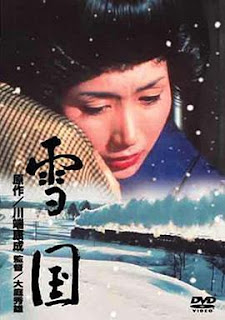66. Hia ū lín bī-hun-hu ê bōng
Sui-bóng án-ne kóng, yi iáu sī bô khiā khí-lâi sûi boeh cháu ê ì-sù.
Āu-lâi, yi koat-tēng m̄ khì sé-thâu, tō chhōa Shimamura kàu āu hûiⁿ kiâⁿ-kiâⁿ leh. Tú-chiah yi tāi-khài tō sī ùi chia liu ji̍p-lâi ê, cháu-lông ē ū yi he tâm-tâm ê chhâ-kia̍h hām boe̍h-á.
Yi peh khí-lâi ê sî liâu kòe ê soaⁿ-pe̍h-tek, khòaⁿ-khoán sī chin-pháiⁿ kiâⁿ kòe. Nn̄g-lâng chí-hó iân hûiⁿ piⁿ, ǹg ū chúi-lâu siaⁿ ê hong-hiàng, lâi kàu ū koân khàm ê khe-hōaⁿ. La̍t-chí chhiū téng ū thiaⁿ-e gín-á siaⁿ. Ū kúi-lia̍p-á la̍t-chí-kiû lak tī in kha-ta̍h ê chháu-châng lih. Komako iōng chhâ-kia̍h kā khak ta̍h phòa, peh chhut la̍t-chí lâi, lóng sī sè-lia̍p la̍t-chí.
Tùi hōaⁿ kiā soaⁿ-phiâⁿ ê pòaⁿ soaⁿ-io hia, khui móa hm̂-á ê hoe-sūi, hiáⁿ-ba̍k ê gîn-sek iô-iô tāng. He sek-chúi sui-jiân hiaⁿ-ba̍k, mā chhin-chhiūⁿ sī thàu-bêng ná bîn-bāng ê mi̍h-kiāⁿ, poe tī chhiu ê thiⁿ-téng.
"Kòe hit-pêng khòaⁿ chi̍t-ē hoⁿh? Ē-tàng khòaⁿ tio̍h lín bī-hun-hu ê bōng neh."
Komako hut leh neh-kha-bóe, chiàⁿ-bīn khòaⁿ Shimamura, kā chi̍t-me la̍t-chí phiaⁿ ǹg i ê bīn, kóng:
"Lí kā góa tòng-chò gōng-á chhòng-tī."
Shimamura bē-hù siám, la̍t-chí khok-khok kòng tio̍h i ê hia̍h-thâu, chiâⁿ thiàⁿ.
"Ū sáⁿ iân-kò͘, lí boeh khì khòaⁿ bōng-á?"
"Ná tio̍h hiah téng-chin?"
"Tùi góa lâi kóng, he sī téng-chin ê tāi-chì. M̄-sī chhiūⁿ lí chit-chióng phok-sóng seng-oa̍h ê lâng."
"Sáng sī phok-sóng seng-oa̍h ê lâng ah?" i bô-lám bô-ne nauh chi̍t-ē.
"Lí ná boeh kóng he sī bī-hun-hu? He m̄-sī bī-hun-hu, téng-kái m̄-sī kā lí kóng kòe ah? Bē-kì-lih ah hioh?"
Shimamura pēng bô bē-kì-lih.
"Góa kóng khah pe̍h leh. Sai-hū hoān-sè bat siūⁿ-kóng, hāu-seⁿ ē-sái hām góa chò-tīn, m̄-koh mā kan-ta sim-koaⁿ án-ne siūⁿ, chhùi to lóng m̄-bat kóng kòe. Sai-hū ê chit-chióng sim-su, hāu-seⁿ hām góa lóng sió-khóa ū kám-kak tio̍h. M̄-koh, goán nn̄g-lâng pēng bô sáⁿ-mih te̍k-pia̍t ê tāi-chì. It-tit lóng sī sûi-lâng kòe ka-tī ê seng-oa̍h. Góa hông bē khì Tokyo ê sî, kan-ta i lâi sàng góa."
I ē-kì-lih Komako bat án-ne kóng kòe.
--
66. 遐有恁未婚夫 ê 墓
雖罔 án-ne 講, 她猶是無徛起來隨欲走 ê 意思.
後來, 她決定毋去洗頭, tō chhōa Shimamura 到後 hûiⁿ 行行 leh. 拄才她大概 tō 是 ùi 遮溜入來 ê, 走廊下有她 he 澹澹 ê 柴屐和襪仔.
她 peh 起來 ê 時 liâu 過 ê 山白竹, 看款是真歹行過. 兩人只好沿 hûiⁿ 邊, ǹg 有水流聲 ê 方向, 來到有懸坎 ê 溪岸. 栗子樹頂有聽 e 囡仔聲. 有幾粒仔栗子毬 lak tī in 跤踏 ê 草叢 lih. Komako 用柴屐 kā 殼踏破, 擘出栗子來, 攏是細粒栗子.
對岸崎山坪 ê 半山腰遐, 開滿茅仔 ê 花穗, 顯目 ê 銀色搖搖動. He 色水雖然顯目, mā 親像是透明 ná 眠夢 ê 物件, 飛 tī 秋 ê 天頂.
"過彼爿看一下 hoⁿh? 會當看著恁未婚夫 ê 墓 neh."
Komako 忽 leh 躡跤尾, 正面看 Shimamura, kā chi̍t-me 栗子抨 ǹg 伊 ê 面, 講:
"你 kā 我當做戇仔創治."
Shimamura 袂赴閃, 栗子 khok-khok 摃著伊 ê 額頭, 誠疼.
"有啥緣故, 你欲去看墓仔?"
"那著 hiah 頂真?"
"對我來講, 彼是頂真 ê 代誌. 毋是像你這種博爽生活 ê 人."
"Sáng 是博爽生活 ê 人 ah?" 伊無攬無拈 nauh 一下.
"你 ná 欲講彼是未婚夫? 彼毋是未婚夫, 頂改毋是 kā 你講過 ah? 袂記 lih ah hioh?"
Shimamura 並無袂記 lih.
"我講較白 leh. 師傅凡勢 bat 想講, 後生會使和我做陣, 毋過 mā 干焦心肝 án-ne 想, 喙 to 攏 m̄-bat 講過. 師傅 ê 這種心思, 後生和我攏小可有感覺著. 毋過, 阮兩人並無啥物特別 ê 代誌. 一直攏是隨人過家治 ê 生活. 我 hông 賣去 Tokyo ê 時, 干焦伊來送我."
伊會記 lih Komako bat án-ne 講過.
--
66.
She showed no sign of leaving, however.
She decided not to wash her hair after all. She took Shimamura down to the back garden. Her damp sandals and stockings were hidden under the veranda where she had come in.
The dwarf bamboo she said she had fought her way through seemed impassible. Starting down along the garden path toward the sound of the water, they came out on the high river bank. There were children's voices in the chestnut trees. A number of burrs lay in the grass at their feet. Komako stamped them open and took out the fruit. The kernels were small.
Kaya plumes waved on the steep slope of the mountain opposite, a dazzling silver in the morning sun. Dazzling, and yet rather like the fleeting translucence that moved across the autumn sky.
"Shall we cross over? We can see your fiances grave."
Komako brought herself to her full height and glared at him. A handful of chestnuts came at his face.
"You're making fun of me."
Shimamura had no time to dodge. The chestnuts lashed at his forehead.
"What possible reason could you have for going to the cemetery?"
"But there's no need to lose your temper."
"I was completely in earnest. I'm not like people who can do exactly as they want and think of no one else."
"And who can do that?" Shimamura muttered weakly.
"Why do you have to call him my fiance? Didn't I tell you very carefully he wasn't? But you've forgotten, of course."
Shimamura had not forgotten. Indeed, the memory gave the man Yukio a certain weight in his thoughts.
--


No comments:
Post a Comment